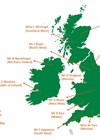Trainees' Forum
What is a leadership fellowship?
What is a leadership fellowship?” This is a question that is often asked about my year out of training to undertake the National Medical Director’s (NMD) Clinical Fellow Scheme. I hope to provide an insight into what a fellowship in...
The BSoT buddy scheme at BAUS 2023: a new initiative for fostering international relationships
The BSoT committee at BAUS, many of whom where involved with the inaugural buddy scheme. The buddy background By Nicholas Boxall, Specialty Registrar, Cambridge University Hospitals NHS Foundation Trust; Immediate Past Chair of BSoT. The BAUS Section of Trainees (BSoT)...
My detour – my year without a urology NTN and bouncing back
When I saw the dreaded words “Oriel: Application not matched” pop-up on my phone my heart sank. This was my second attempt at a urology national training number (NTN), and I had put my life on hold whilst preparing for...
USANZ Trainee Week 2022 – a trip down under
The BAUS Section of Trainees (BSoT) opened applications for two senior UK urology trainees to be sponsored to attend the annual Urological Society of Australia and New Zealand (USANZ) Trainee Week, in Melbourne. The week is held in November each...
Urology ST3 interview update and top tips
This article, written by a Urology ST3 from the West of Scotland Deanery, aims to give the reader an insight into the ST3 interview process along with some helpful hints for those about to undertake the challenge. The aims of...
Innovations in urology – OOPE for trainees
“Innovation is the ability to see change as an opportunity – not a threat” – Steve Jobs [1] The world is changing rapidly. Healthcare has seen a fast reform, especially as a consequence of COVID-19. Urology is a rapidly evolving...
The AUA Residents’ Bowl: with the help of BSoT (13-16 May 2022 • New Orleans, USA)
After successfully sitting both parts of the FRCS(Urol) examination in 2021 and still basking in the knowledge that I would never have to sit another examination again, it’s fair to say there was a certain amount of consternation when I...
Planning and doing a fellowship: advice during the COVID-19 era
To paraphrase Shakespeare, to do, or not to do a fellowship, that is the question. That may be your question; whether or not to pursue a fellowship, even more so due to the uncertainty of the COVID-19 pandemic. There are...
Challenges in urology during and after the COVID-19 pandemic: a trainee perspective
The COVID-19 pandemic has affected urological practice in many ways and at all levels. Social media has been set alight with the hashtag #NoTrainingTodayNoSurgeonsTomorrow highlighting the undesired consequences of the reduction in training opportunities. The impact has been considered by...
The Kennedy Report
Context The death of George Floyd at the hands of racist driven police brutality in May 2020 shook the world into a period of civil unrest and active demonstration against unacceptable discrimination displayed by people of authority. The Black Lives...
JCST, GMC, HEE and SACs: how this alphabet soup translates into a seven-year urology training programme
As many trainees will know, and I count myself among them, there are a plethora of organisations involved in our training. Most of us will be familiar with our deaneries, the haven we return to once a month for our...
My UK reconstructive urology fellowship experience
Surgical training is a long and hard pathway. Having completed medical school, I undertook my internship at the Alfred Hospital in Melbourne. The Alfred Hospital is a leading tertiary teaching hospital in Australia’s second largest city. Prior to commencing my...















